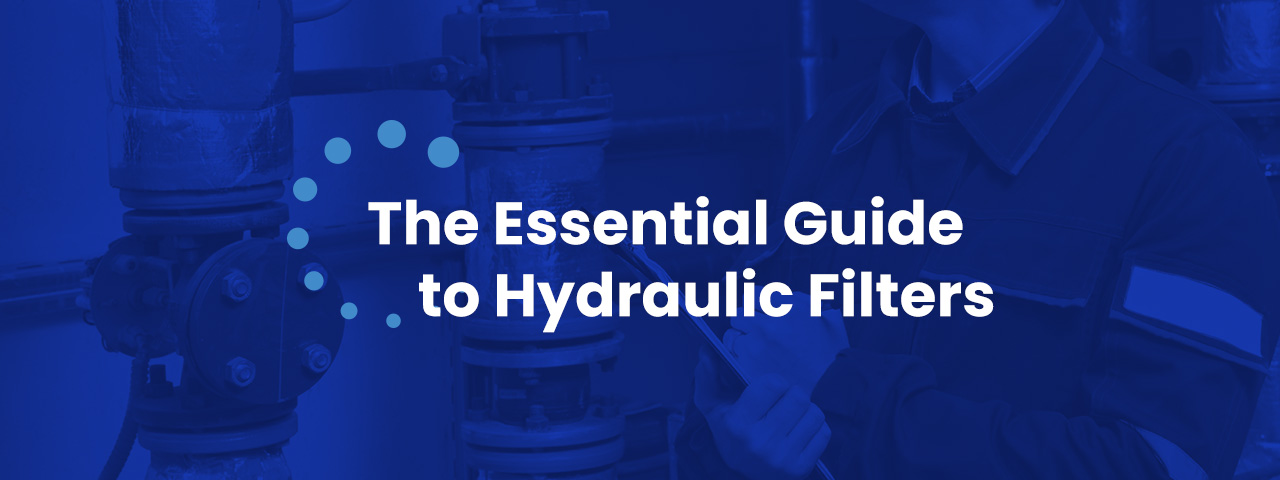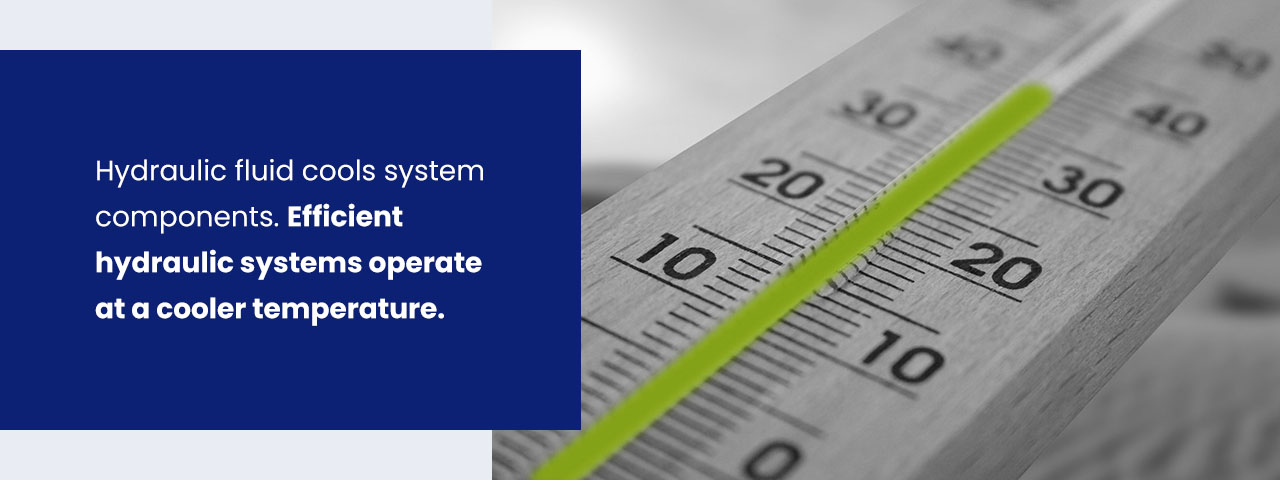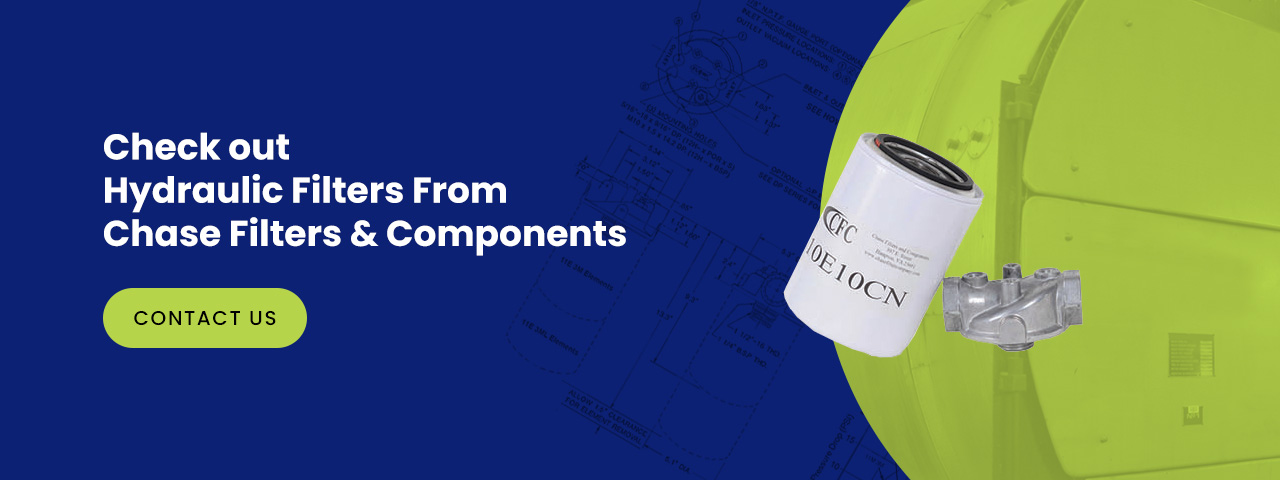February 26, 2025
The Essential Guide to Hydraulic Filters

Jump To:
- What Is a Hydraulic Filter?
- Functions of Hydraulic Filters
- Hydraulic Filter Applications
- Benefits of Hydraulic Filters
- Check out Hydraulic Filters From Chase Filters & Components
Hydraulic system components will only work correctly if the fluid contained in the system is clean. Dirt or other contaminants such as oxidation, sludge, metal, sand, shredded elastomeric seals or chemical byproducts can enter a system and cause deterioration to the components. Contamination can severely affect the physical and chemical nature of hydraulic fluids, leading to system inefficiency. This breakdown in efficiency can result in malfunctioning equipment, costly downtime and unnecessary repairs to damaged parts.
Preventing these damaging particles from entering or continuing in your hydraulic system is paramount to your equipment’s success and longevity. This guide to hydraulic filters will help you determine which kind of hydraulic filter is right for your machinery.
What Is a Hydraulic Filter?
A hydraulic filter is a component within a hydraulic system that removes damaging particulates by forcing hydraulic fluid through a porous filter element. The filter element catches contaminants and prevents them from re-entering the fluid flow and damaging other pieces of equipment further downstream. Contaminants range from dirt to water and reactive chemicals. Their size is on a scale of micrometers, meaning hydraulic filters must be properly sized to filter out even the smallest of particles.
In a hydraulic system, hydraulic fluid performs four essential duties:
- Transmits energy: The motion of the fluid through the system creates pressure used during system operation. Dirt can plug small orifices in flow control and pressure valves. Clogged valves prevent pressure from escaping, potentially resulting in a reduced efficiency, unnecessary maintenance and downtime.
- Seals spaces between metal parts: Fluid seals the tiny cavities between close-fitting components, acting as a pressurized barricade to contaminants. Damaging particulates cannot break this seal. However, dirt can plug holes if the seal breaks.
- Lubricates internal components: Silting is the process by which extremely fine particles of dirt become trapped in clearances, obstructing the lubrication of moving parts. Large contaminants can create the same problem. Poorly lubricated components wear down excessively and are unreliable.
- Cools system components: Hydraulic fluid generates heat during the system operation process through friction. The heat is generally transferred to the walls of the reservoir when the fluid returns from its circuit. Contaminants can create a sludge on the walls of the tank that prevents heat transfer. Efficient hydraulic systems operate at a cooler temperature.
If contaminants hinder any of these functions, significant issues can occur.
Functions of Hydraulic Filters
Hydraulic filters are placed at various locations throughout a system to catch contaminants created at different points in the process. For ideal filtration, filters would be before and after the pump, in the return lines, off-line and within the reservoir. However, considerations for cost and space impact where designers choose to place filters. There are a few primary locations, which determine the types of hydraulic filters used:
- Return lines: These filters are usually low pressure. They collect contaminants from the fluid as it returns to the reservoir and can be positioned along the return line or within the tank. See the Chase 10, 11, & 51 series filters.
- Suction filters: Another example of a low-pressure filter, suction filters are placed at the pump inlet to ensure no contaminants enter the pump. See the chase 14 & 16 series filters.
- Pressure lines: These filters are placed after the pump to keep expensive downstream components safe. Pressure filters have a high-pressure capability to remove internal contamination created within the system. This allows for individual component protection. Saving on downtime, maintenance and component repair or replacement costs.
- Off-lines: Also called kidney loops, these filters continue working even while the central hydraulic system is not working. An off-line filter draws the fluid from the reservoir and returns it after filtration. These filters are usually easier to maintain because of their placement within reach. Some popular types of off-line filters are the drum topper and portable filter cart, which can service multiple hydraulic systems. Another common kidney loop system is the Filter Panel. It can be mounted directly to the hydraulic system and provide 24/7 filtration if necessary.
The function of a hydraulic filter is to remove contaminants at a specific stage of system operation. There are several ways contaminants can enter a system:
- Environmental: Some contaminants accumulate during the manufacturing process of the hydraulic system. Debris like paint chips, rubber particles and metal shavings can collect in the system. An air hose may blow these contaminants away, but others are too small to be seen and must be filtered out. A large amount of contamination also enter the system in new fluid. Fluid already in a system is typically cleaner than any new fluid that you will add; new oil is not necessarily clean, typically 22/20/18. Therefore, you should follow good filtration practice and use a filter cart or pre-filtered fluid whenever you add fluid to keep it within cleanliness level specification. It would help to filter fluid before adding it to a hydraulic system and multiple times throughout operation.
- System-generated: The internal parts of a system, like piston rods and pumps, create contaminants during routine processes. Return-line filters are adept at collecting this kind of contaminant. Castings also wear down due to shock pressures and continual flexing and can then enter the fluid stream.
- External: Air can sometimes enter the system through breather caps, imperfect seals or other openings, condensing on the system’s walls and leading to rust. It is crucial to clean breather caps, as dirt eventually gets back into the fluid. Maintenance specialists also introduce new particles when replacing parts.
Hydraulic Filter Applications
Because hydraulic systems can operate with fluids or gases, multiple industries use them in production and manufacturing. Hydraulic power is involved in aerospace and aviation, agriculture, military and defense, chemical processing and industrial automation, among many other fields.
Modern aircraft use hydraulic systems to activate controls and deploy their landing gear. Missiles and their ground-support equipment both use fluid power. Automobiles use hydraulic power in their braking, steering and transmission mechanisms. Farm equipment like combines and tractors rely on hydraulics, as well.
Benefits of Hydraulic Filters
Hydraulic filters extend the life of your hydraulic system and its components considerably. Filters maintain an impurity-free fluid by limiting the intake of contaminants and swiftly removing new ones.
Hydraulic filters also protect components from failure caused by the build-up of particles between close-fitting parts or lubricated mechanisms. Protection from wear and tear reduces the chance of malfunction and keeps systems safer.
An efficient, well-placed filter also saves you money and downtime due to costly replacements or repairs. Ensuring your hydraulic filter suits your equipment’s needs the first time around will prolong its life and allow you to work more efficiently.
Check out Hydraulic Filters From Chase Filters & Components
With over 30 years in the hydraulic systems business, Chase Filters & Components is an expert in hydraulic filters. We carry suction filters in our 14 and 16 Series, return-line filters in our 10 and 11 Series and many other hydraulic filter specifications.
For our specialty, high pressure filters, see the following:
At Chase Filters & Components, we specialize in custom engineering done quickly. We guarantee 99% efficiency with our elements because they stand the tests of filtration efficiency and quality. Contact us today to learn more about our systems or browse our selection online.

